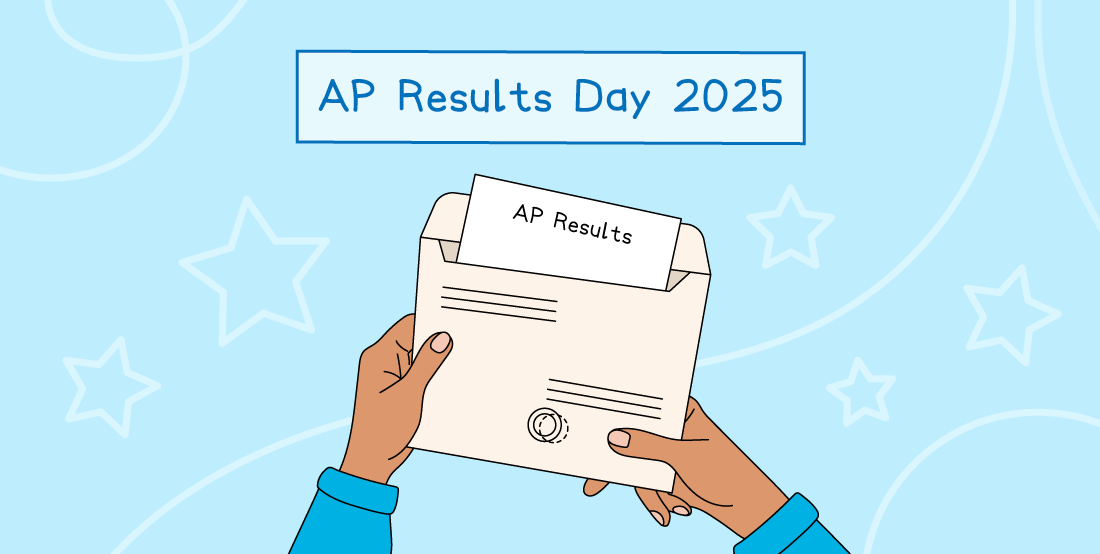AP Results Day 2025: Key Dates & What To Do If Things Don’t Go To Plan
Written by: Holly Barrow
Reviewed by: Liam Taft
Published

Contents
- 1. When do AP results come out in 2025?
- 2. How to get your AP scores
- 3. How to prepare for AP results day
- 4. What grades do I need to pass AP?
- 5. What do my AP scores mean?
- 6. How can my AP scores earn college credit?
- 7. How will AP scores affect my college admission?
- 8. What are AP scores worth in UCAS points?
- 9. AP Results Trends
- 10. What if my AP scores are lower than expected?
- 11. Can you retake AP exams?
- 12. Frequently Asked Questions
- 13. Improve Your Grades with Save My Exams
Advanced Placement (AP) results day 2025 will be here before you know it. If you're taking AP courses, you might be wondering how to navigate such an important day.
This article covers everything you need to know, including when AP scores are typically released, how to access them and what to do next.
When do AP results come out in 2025?
The exact date hasn’t been confirmed by the College Board yet. However, AP results day is expected to fall between early to mid-July 2025.
While the College Board doesn't release an exact date in advance, students in the US and abroad typically get their scores starting around the second week of July, with a rolling release by state or region.
Keep an eye on the College Board website for updated release timelines as July approaches.
What time do AP scores come out?
AP exam scores are usually released from 8am, starting with the East Coast first. The rollout continues across the west throughout the day.
How to get your AP scores
Getting your AP scores is a simple process.
Your AP scores will be released online through your College Board account. Here’s how you can access them:
Log in to your account
Make sure your login details are up-to-date before scores are released
On AP results day, go to the 'My AP Scores' section to view your scores
If you’ve forgotten your username or password, you can reset them on the login page.
How to prepare for AP results day
You’ve spent months studying and preparing for your AP exams. As results day approaches, it’s completely normal to feel nervous.
That being said, there are things you can do to help alleviate any anxiety and stress. Here’s how you can prepare for AP results day to help feel more in control.
How to manage anxiety about your AP scores
It’s natural to worry about what your scores might mean for your college applications or course placements. But remember: AP scores are just one part of your academic journey. Whether the results are better or worse than expected, there are always options.
Here are a few tips to help ease anxiety in the lead up to results day:
Make plans with friends or family
Try not to obsess over 'what if' scenarios
Get a good night’s sleep before the results are released
Have a backup plan ready just in case you didn’t meet your goal for a particular course or school
Why not try out some of the techniques explored in our exam anxiety relief kit? These tips can be applied to your anxiety surrounding results day.
What do I need on AP results day
Since you’ll be accessing your AP scores online, here’s what you’ll need on the day:
College Board login info – make sure you can access your account
A charged device – phone, tablet or computer
Reliable WiFi – to avoid technical hiccups
Notepad and pen – to jot down questions or next steps
College admissions info – if you need to check credit policies or reach out to schools
What grades do I need to pass AP?
AP exams are scored on a scale from 1 to 5, and whether you ‘pass’ depends on how your school or college views the scores.
AP Score Breakdown:
5 – Extremely well qualified (top score)
4 – Well qualified
3 – Qualified (generally considered a passing score)
2 – Possibly qualified
1 – No recommendation
What is considered a ‘passing’ score?
Most colleges consider a 3 or higher as passing
Some competitive schools require a 4 or 5 to grant credit or placement
Our comprehensive guide to the AP grading system goes into this in a little more detail.
What do my AP scores mean?
So, you’ve finally got your results – but how do you make sense of them?
As mentioned, each of your AP exams will be scored on a scale of 1-5, with 5 being the highest.
When checking your results, you’ll see your personal details listed first.
Beneath this, you’ll find a list of all the AP exams you've taken and the scores you’ve earned. If you’ve designated colleges to receive your scores, they will also get your official results electronically.
You won’t see a breakdown of your raw marks or performance by section. However, the College Board sometimes provides score distributions so you can see how your results compare nationally.
How can my AP scores earn college credit?
AP scores can help you earn college credit before you even set foot on campus. When you take an AP exam and score a 3, 4 or 5, many colleges will reward you with credit.
Depending on the school and the subject, your score might let you skip an introductory course or jump straight into higher-level classes. Every college is a little different—some give credit for a 3, while others want a 4 or 5—so it’s worth checking each school’s policy.
Essentially, strong AP scores can save you time and let you dive into the fun stuff faster.
How will AP scores affect my college admission?
Your AP score is just one part of your college application. It usually isn’t required for admission, unless you’re applying for a competitive course at a competitive school.
In the US, colleges and universities take a holistic approach to admissions. This means they look at a range of factors, not just test scores or grades.
That being said, here are the academic factors that they take into account:
GPA (Grade Point Average): This reflects your overall academic performance in high school and is one of the most important factors. Colleges look at both your GPA and the rigor of the courses you’ve taken. Your AP scores do not affect your GPA.
Standardized Test Scores: SAT or ACT scores may be required, though many schools have gone test-optional. This allows applicants to choose whether they want to submit their test scores. If submitted, these scores are used to assess college readiness.
AP Scores: AP exams are not always required for admission, but strong AP scores (usually 3 or above) can:
Strengthen your application by showing academic rigor
Earn you college credit or help you skip introductory courses
What are my AP scores worth in college credit?
The table below shows how AP scores typically compare to college course grades:
AP Exam Score | Recommendation | College Course Grade Equivalent |
5 | Extremely well qualified | A+ or A |
4 | Very well qualified | A-, B+, or B |
3 | Qualified | B-, C+, or C |
2 | Possibly qualified | — |
1 | No recommendation | — |
As you can see, colleges will only take into account the highest AP scores when it comes to allocating credit.
What are AP scores worth in UCAS points?
If you’re a student from the US applying to study at a UK university, you may be wondering how your AP scores translate into UCAS tariff points.
Most UK universities state their course entry requirements in terms of UCAS points rather than grades. This is to help make the application process easier to understand for those taking a non-traditional route, i.e. those who have studied an alternative to A Levels.
Here’s the conversion for AP scores, UCAS tariff points and A Levels:
AP Scores | UCAS Tariff Points | A Level Equivalent |
5, 5, 4 | 136 | AAB |
5, 4, 4 | 128 | ABB |
4, 4, 4 | 120 | BBB |
4, 4, 3 | 112 | BBC |
4, 3, 3 | 104 | BCC |
3, 3, 3 | 96 | CCC |
AP Results Trends
Interested in how students have performed in AP exams in recent years? The College Board publishes annual score analysis that give insight into national trends.
Over the past decade, the percentage of public high school graduates who took at least one AP Exam rose from 32.8% in the class of 2014 to 35.7% in the class of 2024.
In 2024, 22.6% of the graduating class scored a 3 or higher on at least one AP Exam during high school—up from 19.9% in 2014, according to the College Board.
Certain subjects saw notable improvements. The AP US History exam experienced a dramatic jump in pass rates, with 72% of students scoring a 3 or higher in 2024. In 2022, just 48.3% of students passed.
Similarly, AP Macroeconomics saw its pass rate rise to 62% in 2024, up from 51.8% two years prior.
The introduction of new courses like AP African American Studies attracted significant interest. In its first year, the exam saw a 73% pass rate, with 15% of students achieving the top score of 5.
What if my AP scores are lower than expected?
If your AP results aren’t what you were hoping for, it’s important to remember that you have plenty of options.
Despite getting lower scores than expected, you might still manage to earn credit or placement at your chosen college.
Here are some steps you can take next:
Check college credit policies – A score of 3 might still earn you credit or placement at your chosen college
Speak with your teacher or advisor – They can help you reflect on your result and plan next steps
Consider retaking the exam next year if it’s critical for your goals
Focus on the bigger picture – AP scores are just one part of your academic profile
Can I cancel or withhold an AP score?
Yes. If you’re not happy with a score and don’t want colleges to see it, you can request to cancel or withhold it.
Cancelling a score means it will be permanently deleted and won’t be sent to any college.
Withholding a score means you choose not to send it to a specific college, though it still exists in your record.
Requests must be submitted to the College Board by their posted deadlines. Speak to your school AP coordinator or visit the College Board website for instructions and forms.
What support is available?
If you’re feeling overwhelmed, don’t hesitate to reach out:
School counselors and AP coordinators can walk you through your options
Teachers can help you understand your score and whether a retake makes sense
College admissions offices can clarify how they use AP scores in credit or placement decisions
Go to trusted friends and family for emotional support or reach out to a student support service
Can you retake AP exams?
If you want to try to improve your AP scores, you have the option to retake your exams the following year. You can register again and sit the same AP subject the following May.
Colleges only see the scores you send, meaning you’re in control of which scores are submitted. If you do better the second time around, you can choose to send only that result. If you do worse in the retake, your higher score is still valid, so you can choose to submit this to colleges instead.
Our AP revision resources can help you to improve your revision strategy and boost your scores.
Good to know: You'll need to re-register (and repay) for the AP exam through a school or authorized testing center. Not all schools allow students who’ve already graduated to retake exams there, so check with your school or nearby schools early.
Frequently Asked Questions
How much do AP scores matter?
The importance of your AP scores depends on what you’re hoping to achieve from them. AP scores don’t count towards your GPA and many colleges don’t require them for admission, so they’re not vital.
That being said, strong AP scores (4s and 5s) can boost your application, especially at competitive schools.
AP scores are particularly important if you're hoping to earn college credit, skip introductory courses or strengthen your application. This can help you to save money, graduate early or free up room in your schedule.
Certain scholarships and programs will also consider your AP scores, so their significance really depends on your individual circumstances.
What happens if I’m on holiday when AP scores are released?
One of the main advantages of receiving your AP results online is that you can access them from pretty much anywhere. Just make sure you have your College Board login details, reliable WiFi and any contact information you might need in case you have questions.
When will colleges receive my AP results?
If you designated a college to receive your scores when you took the exam, the College Board will send them automatically in early to mid-July.
Scores are only sent to colleges if you request them—colleges won’t see them unless you choose to share. As mentioned earlier, you can also withhold or cancel scores if you don’t want a college to see a particular result.
If you're applying as a high school senior, most colleges use AP scores for credit and placement, not admissions. This means you can submit them after you enroll.
Improve Your Grades with Save My Exams
Save My Exams helps over 1.5 million students each month to prepare for their exams. Get instant access to past papers, exam-style questions, concise revision notes and more to boost both your confidence and grades.
All of our resources are tailored to your exam board, ensuring you focus only on what’s relevant to your course. With expert feedback on practice questions and engaging video content, Save My Exams equips you with everything you need to excel.
Explore our AP Revision Resources
References
Advanced Placement Participation and Performance Continues to Increase
Sign up for articles sent directly to your inbox
Receive news, articles and guides directly from our team of experts.

Share this article


 written revision resources that improve your
written revision resources that improve your